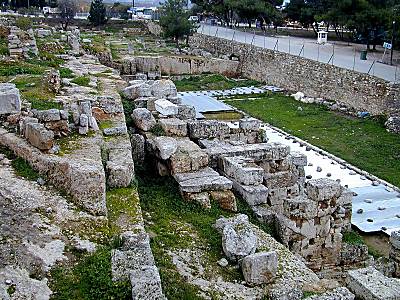 Here's a funny, crazy, scary little story for Halloween from the very talented, but over-the-top Christian fundamentalist Jack Chick.
Here's a funny, crazy, scary little story for Halloween from the very talented, but over-the-top Christian fundamentalist Jack Chick.And a review of the tract's Halloween historical inaccuracies from Joe Carter at the Evangelical Outpost.
Stories, News, and Commentary from Pastor Ted Weis
 Here's a funny, crazy, scary little story for Halloween from the very talented, but over-the-top Christian fundamentalist Jack Chick.
Here's a funny, crazy, scary little story for Halloween from the very talented, but over-the-top Christian fundamentalist Jack Chick. In 1 Corinthians 8-10, the Apostle Paul gives an extended explanation of why Christians should not eat meat sacrificed to idols.
In 1 Corinthians 8-10, the Apostle Paul gives an extended explanation of why Christians should not eat meat sacrificed to idols. United Church of Christ member and Presidential candidate Barack Obama is facing criticism from segments of the gay rights community as his South Carolina campaign begins a weekend series of Gospel concerts in order to reach religious voters in the state.
United Church of Christ member and Presidential candidate Barack Obama is facing criticism from segments of the gay rights community as his South Carolina campaign begins a weekend series of Gospel concerts in order to reach religious voters in the state.I have clearly stated my belief that gays and lesbians are our brothers and sisters and should be provided the respect, dignity, and rights of all other citizens... I strongly believe that African Americans and the LGBT community must stand together in the fight for equal rights. And so I strongly disagree with Reverend McClurkin's views and will continue to fight for these rights as President of the United States to ensure that America is a country that spreads tolerance instead of division.Still, that statement hasn't completely satisfied Joe Solmonese, President of Human Rights Watch, who made the following statement on Thursday:
I spoke with Sen. Barack Obama today and expressed to him our community’s disappointment for his decision to continue to remain associated with Rev. McClurkin, an anti-gay preacher who states the need to ‘break the curse of homosexuality.’ There is no gospel in Donnie McClurkin’s message for gay, lesbian, bisexual and transgender people and their allies. That’s a message that certainly doesn’t belong on any Presidential candidate’s stage.But as a matter of policy, Obama supports every issue of concern to gay rights groups, short of same-sex marriage-- even while a Winthrop/ETV poll of African Americans in South Carolina shows that 74% view "sex between two adults of the same sex" as "unacceptable," with 62% calling it "strongly unacceptable." Certainly if elected, Obama will be a friend to gay civil rights groups.
 It's a busy time at church, so quickly, here's a few interesting articles I've read recently:
It's a busy time at church, so quickly, here's a few interesting articles I've read recently:
 Yesterday my 3rd grade child asked me to help with homework. The assignment was to identify homophones.
Yesterday my 3rd grade child asked me to help with homework. The assignment was to identify homophones. Years ago at Dallas Seminary my professor of Romans, Harold Hoehner, made what I thought was a pretty bold statement:
Years ago at Dallas Seminary my professor of Romans, Harold Hoehner, made what I thought was a pretty bold statement:"The Gospel is not, 'Jesus will pay for your sins if you believe,' nor is it, 'Jesus will pay for your sins if you believe hard enough.' Rather, the Gospel is this: 'Jesus has paid for your sins. You are forgiven. Will you believe?'"Dr. Hoehner made this declaration as we were studying Romans 3:21-26. His point about justification was that the provision of God's righteousness in Jesus Christ's death has satisfied God for both the sins of the past and the present. Anyone then who believes in God's provision in Jesus acquires a right standing before God.
"... a neglected teaching of Lutheran orthodoxy: the doctrine of objective justification. Christ has already justified the world. Each person now needs "subjective justification," the personal appropriation of Christ's work. But we can look at each person we see, including non-Christians, as one of Christ's redeemed children."Inclusivism, sometimes called pluralism, is a misguided, but growing belief in the mainline church that asserts that everyone is already saved. It's off-base because it neglects the necessity of faith in Jesus, without which it is impossible to please God (Hebrews 11:6). Even the world's best known Bible verse, John 3:16, makes plain the necessity of faith in Jesus and the consequence of not trusting him.
 Yesterday I went to our local nursing home to do visitation. Over two hours, I sat and spoke to about eight people.
Yesterday I went to our local nursing home to do visitation. Over two hours, I sat and spoke to about eight people.
 The other week my preschool son and I were shopping at the huge Stuff Mart. I was filling water bottles and my son was standing on top of the seat of the shopping cart.
The other week my preschool son and I were shopping at the huge Stuff Mart. I was filling water bottles and my son was standing on top of the seat of the shopping cart. But that won't stop us from trying, huh?
But that won't stop us from trying, huh? "I want all of you to pray that I can be an instrument of God... We're going to keep on praising together. I am confident that we can create a Kingdom right here on Earth."
"I want all of you to pray that I can be an instrument of God... We're going to keep on praising together. I am confident that we can create a Kingdom right here on Earth."Why, he wants to turn the United States into a theocracy!Instead, the media commentators are giving Obama a pass. Liberal policies will do that.
I thought I was coming to save a ministry but in fact I was being saved, and I accepted Jesus Christ into my life.When do you hear anything like that at United Church of Christ meetings? Talk of redemption and salvation through Jesus? Frankly, it'd do the UCC a lot of good. But that's the language of conservatives and evangelicals, who'd appreciate this saying from Obama-- that is, if he wasn't a liberal:
These days, when people ask me, ‘What role does religion play in your work?’ – You’re running for president of the United States, the leader of the free world. What role does faith play? It plays every role.Every role?
As I travel around the country I feel hopeful and optimistic. There's God's spirit in each and everyone of us that's waiting to be released and to be let out... He wants us to join together and break the partisan divisions.That certainly is UCC language, a hope expressed in the logo, "That They May All Be One" (John 17:21).
The essential humanism of Christianity requires an active, political concern about human dignity and the rights of the poor and weak. But faith says little about the means to achieve those ideals. The justice of welfare reform or tax cuts or moving toward socialized medicine is measured by the outcome of these changes. And those debates cannot be short-circuited by the claim "Thus sayeth the Lord," spoken by the Christian Coalition or the United Church of Christ.Create a kingdom right here on earth. How?
 That's the magic number.
That's the magic number. For the last 40 years, the mainline church has suffered significant decline.
For the last 40 years, the mainline church has suffered significant decline. 40 years of unrelenting decline.
40 years of unrelenting decline. The PLO, Hamas, and Hezbollah have all vowed the destruction of Israel. If Israel has the right to exist and have sustained borders, what legitimate tools of self-defense are they entitled to use?
The PLO, Hamas, and Hezbollah have all vowed the destruction of Israel. If Israel has the right to exist and have sustained borders, what legitimate tools of self-defense are they entitled to use? From the beginning, the United Church of Christ (UCC) has been a non-creedal denomination. It is guided by testimonies, not tests of faith. Beyond the confession that Jesus Christ is the head of the church, you basically have the freedom to believe whatever you want.
From the beginning, the United Church of Christ (UCC) has been a non-creedal denomination. It is guided by testimonies, not tests of faith. Beyond the confession that Jesus Christ is the head of the church, you basically have the freedom to believe whatever you want.